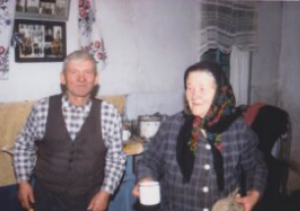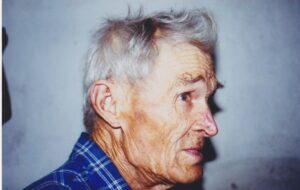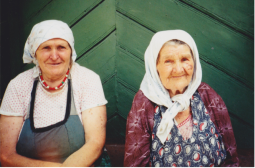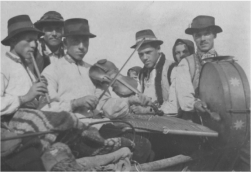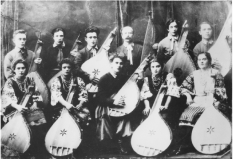Pavlichenko Andrii Hryhorovych, b. 1911
—Would you like it if the farmstead you owned with your mother and brothers were given back to you?
Andrii Hryhorovych: If I had been twenty-five to twenty-seven years old, I would have taken it back today, sure. But I am eighty-three and I can’t work the land anymore. You know, I come out to my vegetable garden and I know that I am a master here. When we got six hectares of this land, we sowed four hectares with wheat and had eight thousand kg of grain. We took it to a state enterprise and got paid 1.25 rubles per each 16 kg. We had money.
………………………………………………………………………………………..
—How much land in total did your family have?
Andrii Hryhorovych: We had enough land, but we did not work it; we didn’t have enough energy. My mother was a widow; we didn’t have working animals like bulls or horses. We only had a cow. My mother would do some work for people, so they could come and sow on our land, but you know how strangers do it: fast and half-heartedly—then they are gone. When we grew up, we went to work as day laborers.
………………………………………………………………………………………..
—At what age were children taught to work?
Andrii Hryhorovych: When they could walk. Around age five or six they would graze geese. When they were six or seven, kids would graze the cow. That was all. Then, if the family had horses, children could drive horse carts, too.
—Was there a division of labor between men and women?
Andrii Hryhorovych: No, everyone worked together, whoever could do the job. Of course, if someone could not do something, a man or another woman would step in. Everyone worked.
………………………………………………………………………………………..
—Did the people join the kolhosp gladly and right away?
Andrii Hryhorovych: No one joined gladly.
………………………………………………………………………………………..
—Were many people deported?
Andrii Hryhorovych: Oh! Yes, many!
—Approximately how many homesteads were deported or left on their own?
Andrii Hryhorovych: About twenty-five people.
—Did anyone come back?
Andrii Hryhorovych: Some people did.
—How many people came back?
Andrii Hryhorovych: After fifteen years.
—Did they tell stories about their life there?
Andrii Hryhorovych: One person was arrested and exiled with his family to Irkutsk. He said, “Why didn’t I get there sooner?” He was sent there by himself, spent three years there, and then came back to get his family. He said life was good there. No one bothered him there. He had land and worked.
………………………………………………………………………………………..
—Did you have to give all your property to the kolhosp?
Andrii Hryhorovych: We took it there right away.
—Including the horses and the cows?
Andrii Hryhorovych: Not the cows; only the horses, the cart, the horse harness, and all the tools.
—Did you have a thresher, a seeding machine, or a winnowing machine?
Andrii Hryhorovych: No. You’re talking about large equipment. I had a cart, two bulls, a young horse, a plow, a cultivator, and the harrows. All the tools were new because my brother and I worked in a bank and earned all of this, y’know? We were planning our lives.
—How much land did you own before the collectivization?
Andrii Hryhorovych: We had six hectares of land: four hectares in one location, one hectare in another, and one hectare under the homestead.
—Did anything remain of the homestead after the arrival of the kolhosp?
Andrii Hryhorovych: You see, they gave… what’s it called? … They moved people out to live in the fields—khutory. This is where the people received land and everything. Move there and live there or move your house, y’know? We didn’t make it because the kolhospy had already begun.
………………………………………………………………………………………..
—How did the people who didn’t join the kolhosp make a living?
Andrii Hryhorovych: Where could they earn anything?
—Did everyone join the kolhosp?
Andrii Hryhorovych: Everyone.
—Were there any odnoosibnyky?
Andrii Hryhorovych: There were some, but they didn’t make it.
—How long did they last?
Andrii Hryhorovych: One or two years, and then…
—Just about until 1933?
Andrii Hryhorovych: 1933… there’s nothing to say about it. But before 1930–1931 the people were still trying to make it, and then they’d say, “God damn it, if this is how it is, I’ll go to the kolhosp.” And they joined.
—What was the attitude like toward those who didn’t join the kolhosp?
Andrii Hryhorovych: People didn’t pay attention to them. They’d say, “Ivan didn’t join the kolhosp, and he’s living alright. We did join, and we are doing okay, too.” The kolhosp paid very little [Na palychky robyly].
………………………………………………………………………………………..
—How much were you paid per workday?
Andrii Hryhorovych: 1.5 kopeks per day, you can throw them where you will.
—Is this what people used to say?
Andrii Hryhorovych: Yes, there was also a saying: “That would buy you powder, soap, and something for the girls.” [Na pudru, na mylo, i shche shchob dlia dievochok khvatilo.]
—Was this a humorous song?
Andrii Hryhorovych: We used to get about 300 grams of second-rate wheat or grain per workday. First-rate grain was sent to the warehouse. If you had 300 workdays, you had 48–80 kilograms. Live with that as you will.
—Was it hard?
Andrii Hryhorovych: Yes.
—What year did you join the kolhosp?
Andrii Hryhorovych: Right away in 1929.
………………………………………………………………………………………..
Andrii Hryhorovych: Everything was from the vegetable garden: potatoes, greens—this and that. They charged high taxes and loan (oblihatsiia) payments.
—Did you have to work the whole day in the kolhosp to earn a workday mark?
Andrii Hryhorovych: Of course.
—They didn’t give you any money per workday, or did you say they paid 0.5 kopeks?
Andrii Hryhorovych: There was no money, you know. If you earned money, they would deduct the loans and you were always in the red.
………………………………………………………………………………………..
—What did you get for your work in the 1930s?
Andrii Hryhorovych: Back then, I made a living. I got married in 1938, and before then I used to drive a tractor and a harvester. Back then, I had the money. When I drove the harvester, I earned 3,500 and 400 kilograms of premium class wheat in a month because I worked in the radhosp.
………………………………………………………………………………………..
—How could people make a living?
Andrii Hryhorovych: You have to make a living with your honest labor: raise a piglet or a calf or grow vegetables for sale. I used to plant tobacco on 0.15 hectares and that was how I made a living.
—You would sell the tobacco and that was enough to make a living?
Andrii Hryhorovych: I processed it and took it to Kyiv for sale, you know. I sold it in bulk—three hundred glasses at a time—and charged six hundred rubles: two rubles per glass. The reseller would charge more.
—Was this in the 1930s?
Andrii Hryhorovych: No, this was after the war.
………………………………………………………………………………………..
—Did people steal from one another before the collectivization?
Andrii Hryhorovych: No, God forbid! It was a great shame, you know. Sometimes it would happen that someone stole a pig from someone in the village. That person would be caught; they’d hang a piece of meat and a piece of lard to his back and take him around the village until he died. One person in our village stole a pig; the whole village gave him a beating, brought him to his house, killed him by his house, and buried him there. At the time, it was the lynch law. Back then, there was no such concept that you had no right to beat someone.
………………………………………………………………………………………..
—When the kolhospy were set up, did people stop stealing?
Andrii Hryhorovych: One woman stole three sheaves of wheat and was sentenced to three years of prison. It was harsh. If people worked on the sugar beets fields and took one home, they’d be very nervous about getting caught. If they got caught, that was it. It was very strict, so no one stole anything.
………………………………………………………………………………………..
— What authority did the priest have in the village?
Andrii Hryhorovych: Oh! The priest had a lot of power. That’s why he was a priest. He had more power than the president has today. Yes. People would turn to the priest for any kind of advice; he was literate and level-headed. He could read everything. Some would go to him to ask if they could get married. And he would say (there were such widows), “Don’t marry that one, he’s no good.”
— Was he a local? What was his name?
Andrii Hryhorovych: Roman Diakovsky. I don’t know where he was from. Just a priest.
— Did he own a house and land?
Andrii Hryhorovych: Yes! A house. A nice house. The priest was not questioned. His word was law. He had a nice house and three desiatyny as well as three more desiatyny in the meadows.
— Did he plow the land himself?
Andrii Hryhorovych: He drank wine and ate sausage and eggs. My mother lived across the river. Our garden faced the river, and so did his.
………………………………………………………………………………………..
—Was there a difference between dosvitky and vechornytsi?
Andrii Hryhorovych: They are the same thing.
—When did people stop going to these events?
Andrii Hryhorovych: When collectivization began, people stopped spinning yarn. The manufactured clothes were on the market already. You could buy a pair of pants for three rubles. We had cooperatives at the time.
—Did people miss dosvitky?
Andrii Hryhorovych: Not really. They gathered in the streets you know. They sang and danced without any problems, you see. There was no interruption.
………………………………………………………………………………………..
—Was there competition between the neighborhoods (kutky)?
Andrii Hryhorovych: Of course, some sang better than others.
—Which ones were better?
Andrii Hryhorovych: The ones that had a better voice.
—Were there singers with a better voice?
Andrii Hryhorovych: Yes, the guys would come out if the girls were going to party. The girls would start singing when there were no guys, and then the guys would join in and they would sing together. We were little children running around.
………………………………………………………………………………………..
—Was there courtship?
Andrii Hryhorovych: Yes, the guys came with a harmonia. There was a wooden plank here where we would eat [pumpkin or sunflower] seeds. When the harmonia player came, people would dance barefoot. You’d hear the sound of the feet.
………………………………………………………………………………………..
—Did people observe spring rituals in your village?
Andrii Hryhorovych: I haven’t noticed.
—What about Kupala Night?
Andrii Hryhorovych: Oh! That was mandatory.
—Was it a major holiday?
Andrii Hryhorovych: Yes, yes. The guys would cut a cherry tree because they had to put it in a pasture where there was more space. They would dig it in and put candles and sing. Then in the evening the girls would come to the pond, bring the wreaths, and put them on the water. The direction where the wreath flowed indicated the location where the girl would get married. This is how it was in our village.
—Did you play any games with the guys?
Andrii Hryhorovych: We’d have some vodka and play “v churky” or “v klioka,” you know? This is where you had to score the ball into a hole. There was another ball game (“u hylky”): one person would hit the ball, and the other would go after it to catch it.
—Were there any games or circle dances related to the songs?
Andrii Hryhorovych: I didn’t pay attention at the time; I think there were none. For Christmas, they would pick a big hill, fifteen or twenty people would get in a sled and go down the hill. Then the horse would take the sled up the hill again.
—Did people sing all the time?
Andrii Hryhorovych: There was no day or night without a song.
— Did people sing Russian songs, the ditties (chastushky)?
Andrii Hryhorovych: No, no. This would happen if some troops, especially Russian troops, would come. Then you could hear the ditties.
………………………………………………………………………………………..
—When did the startsi disappear?
Andrii Hryhorovych: When collectivization came, everyone started working. They started getting allowances and food from the kolhosp. If they had a bad house, the administration would renovate it. And so, the startsi disappeared soon after that.

